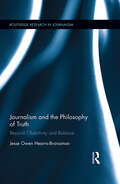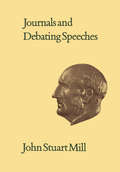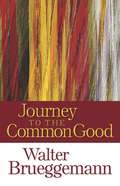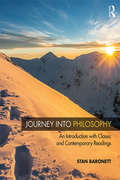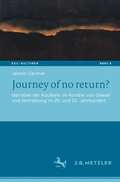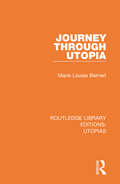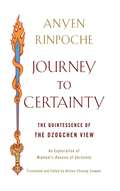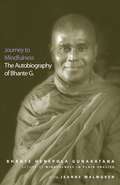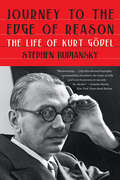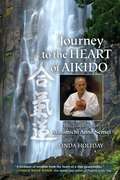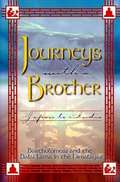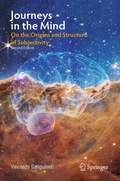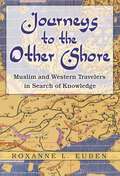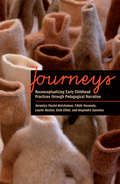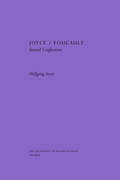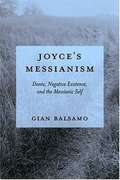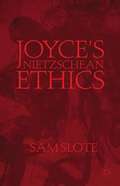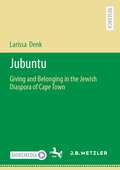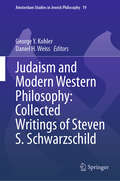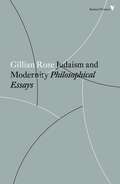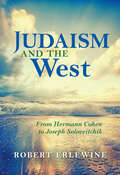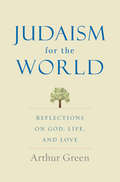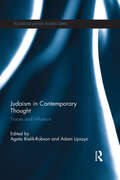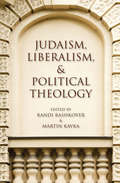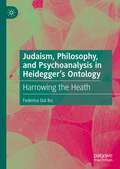- Table View
- List View
Journalism and the Philosophy of Truth: Beyond Objectivity and Balance (Routledge Research in Journalism)
by Jesse Owen Hearns-BranamanThis book bridges a gap between discussions about truth, human understanding, and epistemology in philosophical circles, and debates about objectivity, bias, and truth in journalism. It examines four major philosophical theories in easy to understand terms while maintaining a critical insight which is fundamental to the contemporary study of journalism. The book aims to move forward the discussion of truth in the news media by dissecting commonly used concepts such as bias, objectivity, balance, fairness, in a philosophically-grounded way, drawing on in depth interviews with journalists to explore how journalists talk about truth.
Journals and Debating Speeches: Volumes XXVI-XXVII
by John Stuart Mill John RobsonOne of the constant fascinations Mill holds for the general public as well as scholars derives from the early flowering of his genius. This development is seen in detail in the journal and notebook he kept in France during his fifteenth year, and in the debating speeches and walking-tour journals dating from his eighteenth to twenty-fourth years. This was the period when he first adopted Benthamism as 'a religion,' worked intensively as a propagandist for the faith, and then began the painful reassessment that led to his independent mature thought and action. Some of the results of that reassessment are seen in the diary entries from 1854, written for his wife, which reveal in personal form many of their most passionately held ideas. These materials have never before been gathered, and almost all appear here for the first time in scholarly form. They throw light on contemporary social interests and behavior, and will encourage new assessments of Mill’s life and thought. The texts, the great majority drawn from manuscripts, are presented in critical form, collated, with explanatory and textual notes. The Introduction gives the personal and historical context, with an analysis of content and rhetoric; the Textual Introduction supplies information about the nature and history of the documents, while Appendices provide ancillary materials. Both bibliographic and analytic indexes are included.
Journey To The Common Good
by Walter BrueggemannRespected author and theologian Walter Brueggemann turns his discerning eye to the most critical yet basic needs of a world adapting to a new era, an era defined in large part by America's efforts to rebuild from an age of terror even as it navigates its way through an economic collapse. Yet in spite of these great challenges, Brueggemann calls us to journey together to the common good through neighborliness, covenanting, and reconstruction. Such a concept may seem overwhelming, but writing with his usual theological acumen and social awareness Brueggemann distills this challenge to its most basic issues: where is the church going? What is its role in contemporary society? What lessons does it have to offer a world enmeshed in such turbulent times? The answer is the same answer God gave to the Israelites thousands of years ago: love your neighbor and work for the common good. Brueggemann considers biblical texts as examples of the journey now required of the faithful if they wish to move from isolation and distrust to a practice of neighborliness, as an invitation to a radical choice for life or for death, and as a reliable script for overcoming contemporary problems of loss and restoration in a failed urban economy.
Journey into Philosophy: An Introduction with Classic and Contemporary Readings
by Stan BaronettThe overriding rationale behind this book is a desire to enrich the lives of college students by introducing them to the practice of philosophical thought in an accessible and engaging manner. The text has over one hundred classical and contemporary readings that facilitate studying each philosophical issue from a variety of perspectives, giving instructors the opportunity to choose a set of readings that matches the individual needs of each class. It includes many selections by philosophers whose works are often ignored or underrepresented in other introductory texts. The initial reading, "The Role of Philosophy," is a relevant, clear, and absorbing introduction to the discipline of philosophy. It uses everyday life situations to give students a solid foothold before they journey into specific philosophical topics. In addition, every section of the book has its own special introduction that connects each topic to students’ personal lives. The surrounding narrative is designed to be conversational and comprehensible. Special features include a section on the role of logic, and writing a philosophy paper, two useful tools for approaching and analyzing philosophical writing for students who are new to philosophy. The book is accompanied by a companion website (www.routledge.com/cw/Baronett), with many helpful features, including (for students) review questions for all readings in the book, videos, and 66 related entries taken from the student-friendly Routledge Encyclopedia of Philosophy and (for instructors) 2,500 questions and answers."
Journey of no return?: Narrative der Rückkehr im Kontext von Gewalt und Vertreibung im 20. und 21. Jahrhundert (Exil-Kulturen #6)
by Jasmin CentnerDiese literaturwissenschaftliche Studie beschäftigt sich mit Rückkehrerzählungen, denen eine gewaltvolle Vertreibung vorausliegt. Erfahrungen der erzwungenen Entortung und der anschließenden Rückkehr prägen nicht nur die Handlung von Texten, sondern wirken sich auch auf die Ästhetik der Narrationen aus. Die acht untersuchten Erzähltexte (u.a. von Anna Seghers, Abbas Khider, Peter Weiss, Primo Levi, Herta Müller und Doron Rabinovici) befragen (Un-)Möglichkeiten der Rückkehr aus unterschiedlichen Perspektiven. Texte, die vor dem Hintergrund der nationalsozialistischen Vertreibungspolitik entstanden sind, werden mit aktuellen Erzählungen in Verbindung gesetzt. In vier thematischen Sektionen (u.a. Rückkehr aus dem Exil, aus dem Lager sowie nach Palästina/Israel) wird gezeigt, dass die Rückkehr in unterschiedlichen Kontexten ähnliche Erzählmuster hervorbringt sowie Vorstellungen von Heimat und Ursprünglichkeit problematisiert
Journey through Utopia: A Critical Examination Of Imagined Worlds In Western Literature (Routledge Library Editions: Utopias)
by Marie Louise BerneriIn this title, originally published in 1950, the author has set out to give a description and a critical assessment of the most important (not necessarily the most famous) Utopian writings since Plato first gave, in his Republic, a literary form to the dreams of a Golden Age and of ideal societies which had doubtless been haunting man since the beginning of the conscious discussion of social problems. It is more than a mere compilation and criticism of Utopias, it brings out in a striking way the close and fateful relationship between Utopian thought and social reality, and takes its place among the important books which had appeared in the previous few years, warning us, from various points of view, of the doom that awaits those who are foolish enough to put their trust in an ordered and regimented world.
Journey to Certainty
by Anyen Rinpoche Allison Choying ZangmoApproachable yet sophisticated, this book takes the reader on a gently guided tour of one of the most important texts Tibetan Buddhism has to offer. "Certainty" in this context refers to the unshakeable trust that develops as meditators discover for themselves the true root of reality. In this authoritative presentation, master teacher Anyen Rinpoche opens wide the storehouse of this richly philosophical text in a way that lets readers of all backgrounds easily benefit.
Journey to Mindfulness
by Bhante Henepola Gunaratana Jeanne MalmgrenBhante Gunaratana - Bhante G., as he is affectionately called - has long been among the most beloved Buddhist teachers in the West. Ordained at twelve, he would eventually become the first Buddhist chaplain at an American university, the founder of a retreat center and monastery, and a bestselling author. Here, Bhante G. lays bare the often-surprising ups and downs of his seventy-five years, from his boyhood in Sri Lanka to his decades of sharing the insights of the Buddha, telling his story with the "plain-English" approach for which he is so renowned.
Journey to the Edge of Reason: The Life Of Kurt Gödel
by Stephen BudianskyThe first major biography of the logician and mathematician whose Incompleteness Theorems helped launch a modern scientific revolution. Nearly a hundred years after its publication, Kurt Gödel’s famous proof that every mathematical system must contain propositions that are true—yet never provable—continues to unsettle mathematics, philosophy, and computer science. Yet unlike Einstein, with whom he formed a warm and abiding friendship, Gödel has long escaped all but the most casual scrutiny of his life. Stephen Budiansky’s Journey to the Edge of Reason is the first biography to fully draw upon Gödel’s voluminous letters and writings—including a never-before-transcribed shorthand diary of his most intimate thoughts—to explore Gödel’s profound intellectual friendships, his moving relationship with his mother, his troubled yet devoted marriage, and the debilitating bouts of paranoia that ultimately took his life. It also offers an intimate portrait of the scientific and intellectual circles in prewar Vienna, a haunting account of Gödel’s and Jewish intellectuals’ flight from Austria and Germany at the start of the Second World War, and a vivid re-creation of the early days of Princeton’s Institute for Advanced Study, where Gödel and Einstein both worked. Eloquent and insightful, Journey to the Edge of Reason is a fully realized portrait of the odd, brilliant, and tormented man who has been called the greatest logician since Aristotle, and illuminates the far-reaching implications of Gödel’s revolutionary ideas for philosophy, mathematics, artificial intelligence, and man’s place in the cosmos.
Journey to the Heart of Aikido: The Teachings of Motomichi Anno Sensei
by Linda Holiday Motomichi AnnoJourney to the Heart of Aikido presents the teachings of Motomichi Anno Sensei, one of the few remaining direct students of Morihei Ueshiba, the legendary founder of Aikido. After a lifetime of practice and teaching in Japan, the United States, and Europe, Anno Sensei conveys through his teachings Aikido's essential spirit of love, harmony, gratitude, and purification with simple authenticity and eloquence. Author and translator Linda Holiday--herself a senior instructor of Aikido--brings to life the intimacy of this communication through translated discourses on the deep practice of Aikido and candid dialogues between Anno sensei and Western students. Journey to the Heart of Aikido includes Linda Holiday's vivid account of her adventure as a young woman studying Aikido in the mystical region of Kumano, Japan, in the 1970s, and a poignant telling of Anno sensei's life and his first-hand experience of training with Aikido's founder. An essential resource for the global Aikido community, Journey to the Heart of Aikido also offers spiritual teachings relevant to all contemporary seekers, touching a wide range of themes such as the meaning of martial arts, the integration of body and spirit, the truth of interconnectedness, and the practice of peace, offering all readers insight into the profound spiritual questions at the heart of life.From the Trade Paperback edition.
Journeys With A Brother: Japan To India
by Dalai Lama Xiv BartholomewFans of Bartholomew will enjoy his latest travels detailed in this book.
Journeys in the Mind: On the Origins and Structure of Subjectivity
by Vincenzo SanguinetiThis book presents a systematic exploration of the subjective experience, keeping the investigation for the most part within a subjective first person perspective through the use of “vignettes” as sources of data. It also uses incorporates a ‘"third person” objective approach when that is relevant. The goal of Journeys in the Mind is to capture and convey the operations of the mind: both the shared blueprints common to the elaboration of subjective knowledge as well as the immense fishnet of personalized variables that operate in each mental phase-space and act upon the blueprints to continuously recategorize them into sets of coherent, dynamic outcomes, or mental landscapes. Dr. Sanguineti's meditative perspective holds the promise to enrich the way we understand the workings of the human mind.
Journeys to the Other Shore: Muslim and Western Travelers in Search of Knowledge (Princeton Studies in Muslim Politics #23)
by Roxanne L. EubenThe contemporary world is increasingly defined by dizzying flows of people and ideas. But while Western travel is associated with a pioneering spirit of discovery, the dominant image of Muslim mobility is the jihadi who travels not to learn but to destroy. Journeys to the Other Shore challenges these stereotypes by charting the common ways in which Muslim and Western travelers negotiate the dislocation of travel to unfamiliar and strange worlds. In Roxanne Euben's groundbreaking excursion across cultures, geography, history, genre, and genders, travel signifies not only a physical movement across lands and cultures, but also an imaginative journey in which wonder about those who live differently makes it possible to see the world differently. In the book we meet not only Herodotus but also Ibn Battuta, the fourteenth-century Moroccan traveler. Tocqueville's journeys are set against a five-year sojourn in nineteenth-century Paris by the Egyptian writer and translator Rifa'a Rafi' al-Tahtawi, and Montesquieu's novel Persian Letters meets with the memoir of an East African princess, Sayyida Salme. This extraordinary book shows that curiosity about the unknown, the quest to understand foreign cultures, critical distance from one's own world, and the desire to remake the foreign into the familiar are not the monopoly of any single civilization or epoch. Euben demonstrates that the fluidity of identities, cultures, and borders associated with our postcolonial, globalized world has a long history--one shaped not only by Western power but also by an Islamic ethos of travel in search of knowledge.
Journeys: Reconceptualizing Early Childhood Practices Through Pedagogical Narration
by Veronica Pacini-Ketchabaw Fikile Nxumalo Laurie Kocher Enid Elliot Alejandra SanchezInspired by the idea of documentation as a valuable tool for making learning visible, pedagogical narration offers an opportunity to move beyond checklists and quick answers to a more complex understanding of how children learn, and how teachers might facilitate and support that learning in innovative ways. The authors use stories they collected during a collaborative study to offer a range of possibilities for alternative childhood pedagogies. Cutting edge, yet practical; detailed in its analysis, yet inspiring, this book is a boon to the field of early childhood and primary education studies.
Joyce / Foucault
by Wolfgang StreitSheds new light on James Joyce's use of sexual motifs as cultural raw material for Ulysses and other works Joyce/Foucault: Sexual Confessions examines instances of sexual confession in works of James Joyce, with a special emphasis on Portrait of the Artist as a Young Man and Ulysses. Using Michel Foucault's historical analysis of Western sexuality as its theoretical underpinning, the book foregrounds the role of the Jesuit order in the spread of a confessional force, and finds this influence inscribed into Joyce's major texts. Wolfgang Streit goes on to argue that the tension between the texts' erotic passages and Joyce's criticism of even his own sexual writing energizes Joyce's narratives-and enables Joyce to develop the radical skepticism of power revealed in his work.
Joyce's Messianism: Dante, Negative Existence, and the Messianic Self
by Gian BalsamoIn his study of negative existence and how it affects James Joyce's principal characters, Gian Balsamo joins the ongoing debate about the Irish writer's relationship to Dante and considers the centrality of messianism to that relationship. Finding in Dante a negative poetics that becomes a model for Joyce, Balsamo suggests that the inception and cessation of life - two occurrences that conventionally are deemed impossible to experience personally and directly - typically frame the existential experiences of Joyce's main characters. Balsamo perceives Stephen, Leopold, and Shem as messianic figures because they rebel against this convention, clustering their lives around the very events of inception and burial. Balsamo traces the engagement of each of the three characters in a negative existence immune from the rules and limitations of ordinary experience. Each struggles to express rather than exorcise the fecundity of his own mortality; each reinvents his biography as involving the pivotal transaction of one death - be it a mother's, a son's, or even that of his own body - in return for catharsis. Durkheim, and Noam Chomsky, Balsamo challenges the current debate by identifying the messianic thread that ties together the biographies of Joyce's three characters. Faced with the fissure between history and poetic vocation, Stephen embraces the sacrificial poetry of silence. Faced with the domestic squalor provoked by the loss of his son, Leopold renews at every meal the cathartic exchange of food and semen. Faced with a destiny of death and decomposition, Shem reenacts the tradition of the medieval cycle drama, stretching his own body like a parchment on a cross and then rubricating it like a sacred manuscript.
Joyce’s Nietzschean Ethics
by Sam SloteThe first book-length treatment of James Joyce's work through the lens of Friedrich Nietzsche's thought, Slote argues that the range of styles Joyce deploys has an ethical dimension. This intersection raises questions of epistemology, aesthetics, and the construction of the 'Modern' and will appeal to literary and philosophy scholars.
Jubuntu: Giving and Belonging in the Jewish Diaspora of Cape Town
by Larissa DenkThis study investigates the nexus between giving, belonging and Jewishness in South Africa. Charitable interactions are as much manifestations of inequalities as an expression of the giving individual’s desire to alleviate them. Structuring aspects like class, race, economics, and post-apartheid politics are at the basis of this study. At the same time, though, it is individual agency reproducing inequalities and making sense of the ambiguity of the charitable interaction. In the context of the Jewish community in South Africa this analysis shows how the community’s organisations, practices and concepts are connected to charitable giving. The author carved out three dimensions, which are entangled, reinforced, or at times contradict each other: Belonging, diaspora and charitable giving. Along with shared values and practices it relates to, volunteering or charitable giving connects one individual to a group, while possibly excluding another from it. Expressing belonging to the Jewish collective as a diaspora community, relates individuals or collectives to the triadic relationship between local diaspora group, host society and homeland and other local communities of the same diaspora.
Judaism and Modern Western Philosophy: Collected Writings of Steven S. Schwarzschild (Amsterdam Studies in Jewish Philosophy #19)
by Steven S. SchwarzschildWhat are the implications of Franz Rosenzweig's quasi-racialist commonalities with Heidegger's thought? Was Kant a 'Jewish thinker'? Does Spinoza's philosophy lend support to totalitarianism? Was Marx's philosophy more shaped by Jewish cultural tradition than is typically assumed? Was there a strong challenge to Strauss's reading of Maimonides already in the 1940s? This volume contains a collection of Steven S. Schwarzschild's (1924-1989) most important unpublished works, the majority of which were found in his literary remains. The essays present provocative perspectives on influential philosophical figures such as Maimonides, Spinoza, Kant, Hegel, Marx, Rosenzweig, Heidegger, and Leo Strauss. As one of the most original twentieth-century thinkers in the field of Jewish philosophy, Schwarzschild's analysis provides readers with new ways of understanding modern Western philosophy, Jewish religious tradition, and the relation between them.
Judaism and Modernity: Philosophical Essays
by Gillian RoseA reinterpretation of thinkers from Benjamin and Rosenzweig to Simone Weil and DerridaJudaism and Modernity: Philosophical Essays challenges the philosophical presentation of Judaism as the sublime ‘other’ of modernity. Here, Gillian Rose develops a philosophical alternative to deconstruction and post-modernism by critically re-engaging the social and political issues at stake in every reconstruction.
Judaism and the West: From Hermann Cohen to Joseph Soloveitchik (New Jewish Philosophy and Thought)
by Robert ErlewineGrappling with the place of Jewish philosophy at the margin of religious studies, Robert Erlewine examines the work of five Jewish philosophers—Hermann Cohen, Martin Buber, Franz Rosenzweig, Abraham Joshua Heschel, and Joseph Soloveitchik—to bring them into dialogue within the discipline. Emphasizing the tenuous place of Jews in European, and particularly German, culture, Erlewine unapologetically contextualizes Jewish philosophy as part of the West. He teases out the antagonistic and overlapping attempts of Jewish thinkers to elucidate the philosophical and cultural meaning of Judaism when others sought to deny and even expel Jewish influences. By reading the canon of Jewish philosophy in this new light, Erlewine offers insight into how Jewish thinkers used religion to assert their individuality and modernity.
Judaism for the World: Reflections on God, Life, and Love
by Arthur GreenAn internationally recognized scholar and theologian shares a Jewish mysticism for our times Judaism, one of the world&’s great spiritual traditions, is not addressed to Jews alone. In this masterful book, Arthur Green calls out to seekers of all sorts, offering a universal response to the eternal human questions of who we are, why we exist, where we are going, and how to live. Drawing on over half a century as a Jewish seeker and teacher, he shows us a Judaism that cultivates the life of the spirit, that inspires an inward journey leading precisely toward self-transcendence, to an awareness of the universal Self in whose presence we exist. As a neo-hasidic seeker, he is both devotional and boldly questioning in his understanding of God and tradition. Engaging with the mystical sources, he translates the insights of the Hasidic masters into a new religious language accessible to all those eager to build an inner life and a human society that treasures the divine spark in each person and throughout Creation.
Judaism in Contemporary Thought: Traces and Influence (Routledge Jewish Studies Series)
by Agata Bielik-Robson Adam LipszycThe central aim of this collection is to trace the presence of Jewish tradition in contemporary philosophy. This presence is, on the one hand, undeniable, manifesting itself in manifold allusions and influences – on the other hand, difficult to define, rarely referring to openly revealed Judaic sources. Following the recent tradition of Lévinas and Derrida, this book tentatively refers to this mode of presence in terms of "traces of Judaism" and the contributors grapple with the following questions: What are these traces and how can we track them down? Is there such a thing as "Jewish difference" that truly makes a difference in philosophy? And if so, how can we define it? The additional working hypothesis, accepted by some and challenged by other contributors, is that Jewish thought draws, explicitly or implicitly, on three main concepts of Jewish theology, creation, revelation and redemption. If this is the case, then the specificity of the Jewish contribution to modern philosophy and the theoretical humanities should be found in – sometimes open, sometimes hidden – fidelity to these three categories. Offering a new understanding of the relationship between philosophy and theology, this book is an important contribution to the fields of Theology, Philosophy and Jewish Studies.
Judaism, Liberalism, & Political Theology (Encounters: Explorations in Folklore and Ethnomusicology)
by Daniel Weidner Dana Hollander Zachary Braiterman Eric Jacobson Robert Erlewine Sarah Hammerschlag Bruce Rosenstock Brian Britt Jerome E. Copulsky Gregory Kaplan Daniel Brandes Oona EisenstadtThese essays propose &“a new and richly detailed engagement between Judaism and the political&” (Jewish Book World).Judaism, Liberalism, and Political Theology provides the first broad encounter between modern Jewish thought and recent developments in political theology, arguing in opposition to impetuous associations of Judaism and liberalism and charges that Judaism cannot engender a universal political order. The vexed status of liberalism in Jewish thought and Judaism in political theology is interrogated with recourse to thinking from across the Continental tradition. &“This collection of essays, which examines political theology from the distinct perspective of Jewish philosophy, could not be timelier or more useful for scholars and students navigating what is often viewed as very dense and difficult material.&”—Claire Elise Katz, Texas A&M University
Judaism, Philosophy, and Psychoanalysis in Heidegger’s Ontology: Harrowing the Heath
by Federico Dal BoIn this book, Federico Dal Bo analyzes the question of Heidegger’s anti-Semitism from a deconstructive point of view, appealing not only to philosophy but also to psychoanalysis, gender studies, and critical studies. Deconstruction famously discourages simplistic oppositions whilst encouraging a more careful analysis of cultural and philosophical complexities of a semantic field. In the present case, a deconstructive analysis of Heidegger’s anti-Semitism rejects both a stern condemnation of his oeuvre and a simplistic acquittal from this infamous accusation. It rather suggests that the question of his anti-Semitism shall be examined from the broader perspective—from the end of metaphysics.
